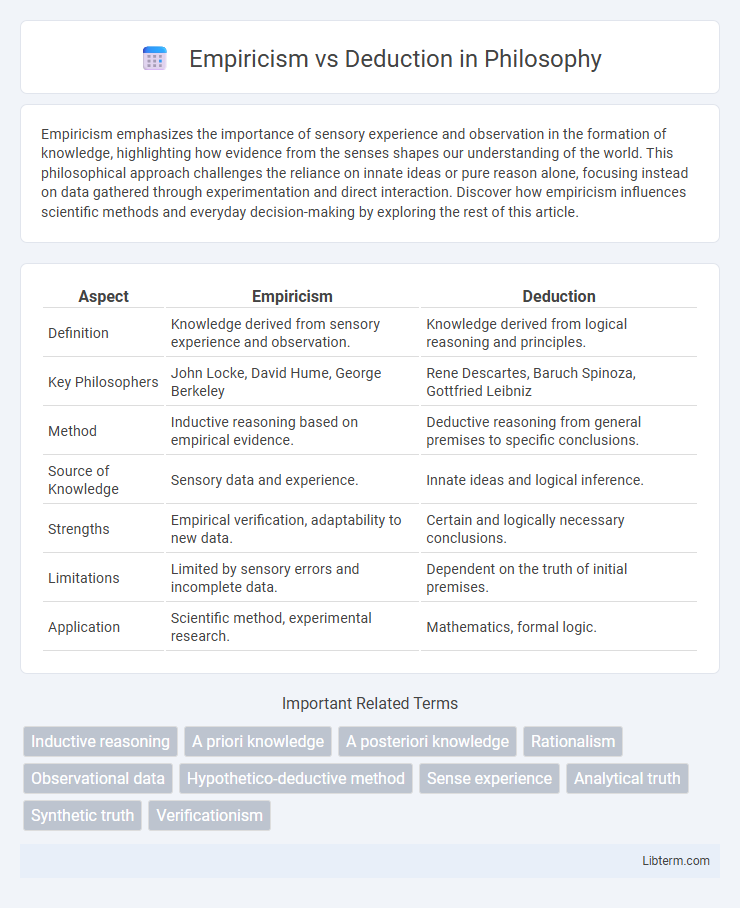Empiricism emphasizes the importance of sensory experience and observation in the formation of knowledge, highlighting how evidence from the senses shapes our understanding of the world. This philosophical approach challenges the reliance on innate ideas or pure reason alone, focusing instead on data gathered through experimentation and direct interaction. Discover how empiricism influences scientific methods and everyday decision-making by exploring the rest of this article.
Table of Comparison
| Aspect | Empiricism | Deduction |
|---|---|---|
| Definition | Knowledge derived from sensory experience and observation. | Knowledge derived from logical reasoning and principles. |
| Key Philosophers | John Locke, David Hume, George Berkeley | Rene Descartes, Baruch Spinoza, Gottfried Leibniz |
| Method | Inductive reasoning based on empirical evidence. | Deductive reasoning from general premises to specific conclusions. |
| Source of Knowledge | Sensory data and experience. | Innate ideas and logical inference. |
| Strengths | Empirical verification, adaptability to new data. | Certain and logically necessary conclusions. |
| Limitations | Limited by sensory errors and incomplete data. | Dependent on the truth of initial premises. |
| Application | Scientific method, experimental research. | Mathematics, formal logic. |
Understanding Empiricism: Definition and Core Principles
Empiricism emphasizes knowledge acquisition through sensory experience and observation, asserting that all ideas and concepts originate from empirical evidence. Core principles include the reliance on experimentation, induction, and the rejection of innate ideas, highlighting the importance of continuous verification and evidence-based reasoning. This approach contrasts with deduction by prioritizing data-driven understanding over purely logical inference.
What is Deduction? Key Concepts Explained
Deduction is a reasoning process that starts with general premises to reach a logically certain conclusion. Key concepts include syllogisms, where two premises lead to a specific inference, and the emphasis on a priori knowledge that does not rely on sensory experience. Deductive reasoning is fundamental in mathematics and formal logic, providing conclusions that are necessarily true if the premises are accurate.
Historical Origins: From Aristotle to Modern Philosophy
Empiricism, rooted in the works of Aristotle, emphasizes knowledge derived from sensory experience and observation, shaping early scientific inquiry. Deduction, traced to Aristotle's syllogistic logic, forms the foundation of reasoning from general principles to specific conclusions and was further developed in modern philosophy by thinkers like Descartes. The historical interplay between these methods influenced the evolution of epistemology, balancing empirical evidence with rational deduction in the pursuit of knowledge.
Empiricism vs Deduction: Main Differences
Empiricism emphasizes knowledge derived from sensory experience and observation, whereas deduction relies on logical reasoning from general premises to specific conclusions. Empiricists prioritize evidence gathered through experiments and experience, contrasting with deduction's use of structured, a priori reasoning independent of sensory input. The main difference lies in empiricism's bottom-up approach versus deduction's top-down method in knowledge acquisition.
Advantages of Empirical Approaches
Empirical approaches provide concrete evidence through observation and experimentation, enhancing the reliability and validity of knowledge claims. These methods allow for continuous testing and refinement, ensuring adaptability to new data and real-world scenarios. Empiricism's reliance on sensory experience fosters practical applications and strengthens scientific inquiry by grounding theories in measurable outcomes.
Strengths and Challenges of Deductive Reasoning
Deductive reasoning offers the strength of providing logically conclusive conclusions when premises are true, ensuring certainty and consistency in knowledge acquisition. Its main challenge lies in dependency on the accuracy and completeness of initial premises, which, if flawed, can lead to invalid conclusions despite rigorous logic. Deductive methods excel in fields like mathematics and formal logic but may struggle to generate new knowledge without empirical input.
Famous Thinkers: Locke, Hume, Descartes, and Kant
John Locke and David Hume advocated for empiricism, emphasizing knowledge derived from sensory experience and observation, while Rene Descartes championed deduction, relying on reason and innate ideas to establish certain knowledge. Immanuel Kant synthesized these approaches by arguing that while all knowledge begins with experience, the mind actively structures it through innate categories, bridging empiricism and rationalism. Their combined contributions form the foundation of modern epistemology, highlighting the interplay between empirical data and logical reasoning.
Real-World Applications in Science and Research
Empiricism emphasizes observation and experimentation as fundamental to acquiring knowledge, playing a crucial role in fields like experimental physics, medicine, and environmental science where data-driven evidence guides decision-making. Deduction relies on logical reasoning from general principles to specific conclusions, underpinning theoretical frameworks in mathematics, formal logic, and computer science algorithm development. Combining empirical data with deductive reasoning enhances scientific research accuracy and innovation across disciplines, driving advancements in technology and understanding complex phenomena.
Criticisms and Limitations of Each Method
Empiricism faces criticism for its reliance on sensory experience, which can be subjective and prone to errors, limiting its ability to establish universal truths. Deduction is often challenged for its dependence on initial premises, which, if flawed or inaccurate, lead to incorrect conclusions despite logical consistency. Both methods struggle in isolation: empiricism cannot guarantee certainty beyond observed phenomena, while deduction cannot generate new knowledge without empirical input.
Finding Balance: Integrating Empiricism and Deduction
Finding balance between empiricism and deduction enhances scientific inquiry by combining observation-based evidence with logical reasoning. Empiricism gathers data through sensory experience, while deduction applies structured principles to derive conclusions, fostering robust knowledge development. Integrating both approaches ensures comprehensive understanding and mitigates the limitations inherent in relying solely on empirical data or pure logic.
Empiricism Infographic

 libterm.com
libterm.com